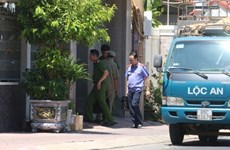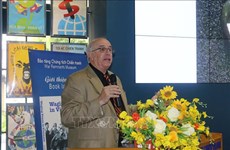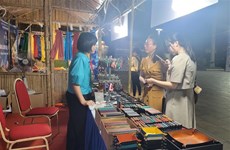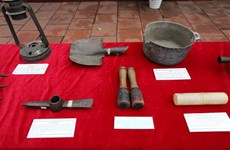Vietnamese students among winners at ASEAN Youth Social Journalism Contest 2021
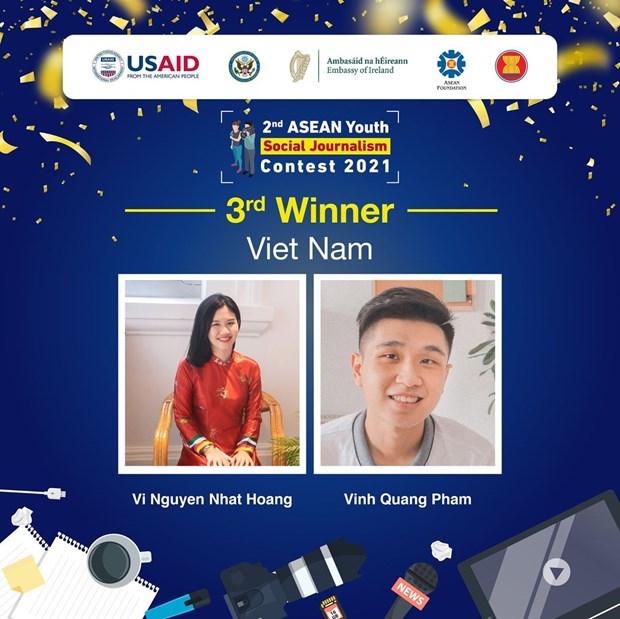 Two RMIT Vietnam students win the third prize at the ASEAN Youth Social Journalism Contest for a social media campaign to raise awareness of the plastic consumption among the Vietnamese youth during the COVID-19 pandemic. (Photo: ASEAN Youth Social Journalism Contest)
Two RMIT Vietnam students win the third prize at the ASEAN Youth Social Journalism Contest for a social media campaign to raise awareness of the plastic consumption among the Vietnamese youth during the COVID-19 pandemic. (Photo: ASEAN Youth Social Journalism Contest)Hanoi (VNA) – A team of two RMIT Vietnam students won the third prize at the ASEAN Youth Social Journalism Contest for a social media campaign to raise awareness of the plastic consumption among the Vietnamese youth during the COVID-19 pandemic, RMIT University Vietnam announced on September 24.
Project “Flatten the Plastic Curve” run Hoang Nguyen Nhat Vi and Pham Quang Vinh, who are pursuing a bachelor’s degree in Communication, successfully reached nearly 200,000 young after only one month.
Following the theme #ASEANYouth and COVID-19 ─ Response, Recovery, and Resilience, the duo decided to empower young online shoppers to take small but effective actions while making their orders through comic-like graphics and marketing.
Vi said that COVID-19 has challenged Vietnamese people’s sustainable habits since they have been requested to minimise physical contact and unnecessary travelling.
“As the most adaptable generation of the region, ASEAN youth quickly adjusted themselves to the situation by transferring their daily activities to digital platforms,” she said.
“Convenience comes with a price, and minimised physical contact is a trade-off between health and environment. The ‘new normal’ life is now indulged with single-use plastic packaging.”
Throughout the campaign, the duo encouraged young people to make changes such as ordering from a single shop to minimise plastic packaging, or directly messaging to the shop owners or shippers to remind them to reduce the plastic wrappings as much as they can.
Starting the regional round with great enthusiasm, the duo instantly faced a huge challenge due to the latest COVID-19 outbreak in Ho Chi Minh City.
Vinh said that as the lockdown was imposed, “we were unable to go out to produce video contents or organise a youth event as required by the competition rules.”
“We had only one month to run our entire campaign, and the results from the first two weeks were so disappointing that we started to question our own purpose,” he said.
“However, as the theme of this year’s contest, we have gradually adapted to this new situation by re-adopting a digital-led approach for our plastic reduction intention.
“We revised our strategy, reached out to environmental experts, and published comic-inspired content in minimalist and green living community groups to drive more traffic to the page.”
By the end of the campaign, the duo reached over 40,000 young people with their print ads, received organic shares and had their campaign mentioned in four Vietnamese macro influencers’ Facebook pages. A group of students even asked Vinh and Vi if they could volunteer for the campaign as part of their university project.
“Without resilience, none of these results would have ever happened,” Vinh said.
“The adaptability and resilience that we had to perform during the competition are the key qualities necessary for any profession in the ever-changing world we are living now. Nobody knows what may come our way, so getting ourselves ready for volatility did us good.”
Launched last December, the 2nd ASEAN Youth Social Journalism Contest 2021 was endorsed by the ASEAN Senior Officials Meeting on Youth (SOMY) and supported by the ASEAN Foundation, ASEAN Secretariat, Ireland Embassy, and the ASEAN-USAID PROSPECT, a joint project of the US Agency for International Development (USAID) and US State Department.
At the competition, ASEAN contestants were required to share and promote fact-based and compelling messages showcasing the importance of ASEAN youth at the forefront of efforts to combat the COVID-19 pandemic.
According to the organiser, ASEAN youth leadership is at the forefront of efforts to combat the pandemic as young people have a pivotal role to play in limiting the epidemic and alleviating its effects on public health, community and the economy as a whole.
They have been responding to the pandemic in a multitude of ways – by serving as health workers and community volunteers, leading public health promotion initiatives, as well as combating the pandemic through artistic, scientific, entrepreneurial, and technological innovations although they are specifically vulnerable to the disruptions caused by the pandemic./.









